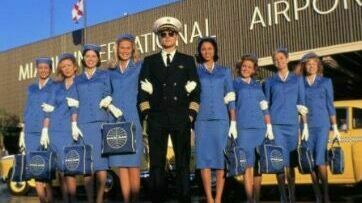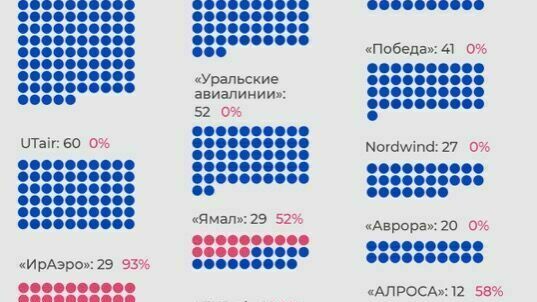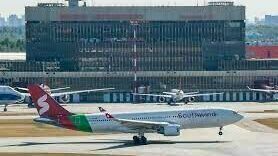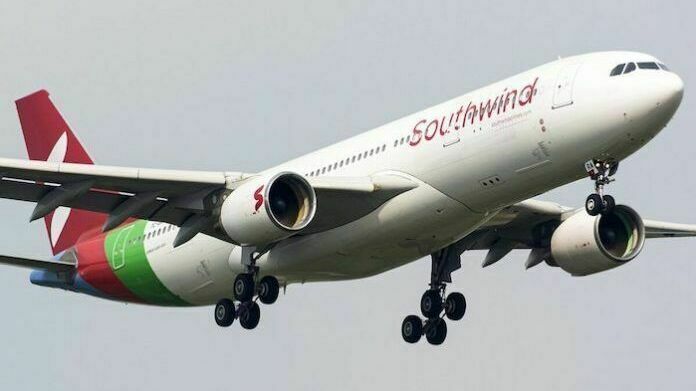Posted 1 марта 2023, 15:09
Published 1 марта 2023, 15:09
Modified 1 марта 2023, 17:05
Updated 1 марта 2023, 17:05

Catch me if you can: How Russian aviation is flying away from sanctions
Yelena PETROVA, Natalia SEIBIL
Russian aviation is increasingly reminiscent of Leonardo DiCaprio's hero in Steven Spielberg's masterpiece: for a year now, airlines have been trying to support business in every possible way and not leave the country in the care of railways and motor transport, although the latter, by the way, has no less problems than its winged brethren.
Steeplechase – this is how the everyday life of Aeroflot and its comrades look like.


What do we have with the planes
The state news agency RIA Novosti posted a curious scheme in January of this year.
According to the calculations of colleagues, Aeroflot flies 99% on Boeing and Airbus. 10 out of 18 airlines operate exclusively Western cars. According to the Ministry of Transport, by the summer of 2022, 77 aircraft leased by Russian airlines were detained. Rosaviation has started urgent re-registration of airliners. The imposed sanctions prohibit the purchase of aircraft that were in operational leasing, explains Oleg Panteleyev, executive director of the agency "Aviaport":
"It was possible to buy back only those planes that were in financial leasing. According to the most up-to-date data of the Ministry of Transport, the problem of double registration was solved for 186 foreign-made aircraft. That is, this is the park that can be used on the international route network without risks and restrictions. Plus, there are about 160 "Superjets" in addition to this number".
But the state is not a fool – no one in Rosaviation will dictate to airlines where to fly.
Therefore, where they will operate the aircraft was left to the discretion of the carriers themselves.
Leasing companies are already turning to insurers with claims to recover lost assets. If insurance companies compensate for the damage, they will certainly go to court, regardless of whether the airlines transfer leasing payments to ruble accounts or not. Oleg Panteleyev believes that there are such risks, although not in the short term:
"As a result, this may lead to court decisions directed against Russian airlines. But, on the other hand, we are well aware that Russian airlines regularly transfer leasing payments to special ruble accounts. Therefore, the situation will be stalemate. Give us the money back – please, we collected this money. Try to withdraw them from the ruble account. The sanctions of your own government do not allow you to do this. Here lengthy court proceedings are quite likely".
Spare parts: counterfeit, parallel import or "made in the USA"
The experts with whom Novye Izvestia spoke were relieved to note that it was possible to stop the cannibalization of aircraft when they were simply disassembled for lack of spare parts.
If the issue had not been resolved, our anonymous source says, there would have been several months left to fly. There are only two documented facts when the Yakutia Airline disassembled two Superjets for spare parts. Contrary to propaganda and stories about the "Russian" medium-haul aircraft, the share of imported spare parts in the "Superjet" reaches 72%. Cannibalization should be understood as the process when aircraft are disassembled for spare parts without the possibility of its restoration. But our fleet has not reached such a state, experts say:
"Yes, I am sure there are planes waiting for some scarce positions on spare parts, it is quite possible that something is being removed from them, but most airlines strive to get problematic spare parts at the first opportunity, restore airworthiness and return to flying. - I'm sure Panteleyev. According to recent estimates, the airlines have managed to create a stock of spare parts that will last for 2-4 months".
In the first months, missing parts had to wait for several weeks, experts familiar with the situation say. Now the delivery takes several days. For comparison, until February 2022, spare parts arrived within a day.
However, to what extent the parts obtained meet the requirements of aircraft manufacturers is a big question. Hero of Russia, Honored Test Pilot Alexander Garnayev recalls that when foreign cars flooded into Russia in the 90s, there were no spare parts for them:
"For example, I had a 1988 Volkswagen Passat, which was ideally matched by a thermostat from Moskvich-401. The junk that was sold for pennies on the car markets fit the size and worked perfectly. Do I need to explain what is the difference between an airplane and a car? Especially if we are talking about a passenger plane: the car goes and stops, and the plane cannot "go, go and stop" because a counterfeit spare part was stuffed into it.After the adoption of the 10th package of sanctions, the situation with intermediaries has sharply tightened, on which the delivery of absolutely all parts and assemblies for aircraft now lies".
Garnayev says:
- Now, if someone circumvents the sanctions, it is quite possible for him to get a prison sentence in America on both sides of the ocean, not to mention ruin. Well, what difference does it make to me which way someone gets something. Or some kind of counterfeit. It's all illegal. And unlike my old Volkswagen, with an airplane, such tricks will cost much more.The ways of spare parts to Russia are really mysterious.
As experts told us, they are brought to Russia by one-day firms. Russian companies register a legal entity in third countries, conduct several operations. If you need to deliver a batch of parts, they deliver it and stop working. Such companies operate in the Arab world, as well as in North and South Africa. This is also due to the fact that many managers studied in Moscow at one time, and now occupy command posts in their countries.
"How tenacious these chains are, as practice shows, there are two factors. First: one chain can be cut, the second can be blocked, but five new ones will be created. Therefore, the question is ambiguous. The only big risk is that if extraordinary measures are really taken by the US or European authorities, then it is possible to really tighten control so much that the work of such logistics chains will become seriously complicated. But we see that despite strict sanctions, Iran has been receiving the necessary spare parts with the brand "made in the USA" for decades", - Oleg Panteleyev recalls.There is little hope for China, which will "help".
Experts are sure that China will not get involved in this. China is afraid of secondary sanctions, it doesn't really need it at all, market experts say on condition of anonymity. He has his own huge market, he brings his aviation to it. China has a trend to create its own medium-haul and short-haul aircraft, its own Chinese design and Chinese construction. Dragging chestnuts out of the fire for Russia, buying spare parts from Boeing in order to transfer them to Russia – what's the point? There is more negativity than positivity.
No matter what unknown ways spare parts arrive in Russia, it will not be possible to completely break away from the manufacturer. If the plane is flying, its engines are running, experts explain on their fingers. Sensors are installed on the engines that record their operation, dump information into black boxes and to the manufacturer. If you do "self–medication" and carry out maintenance yourself, then the result is clear - the question will not be that problems will come, but only when it will happen.
In addition, modern airplanes are a kind of flying computers. If brake discs, pads and filters can be bought "left", then there is no pirated software on airplanes, only the manufacturer has it. After a certain number of updates, it will be impossible to fly with such software, experts warn.
Where and how to service aircraft
The question of where and how to repair aircraft has become a key issue for the functioning of Russian civil aviation.
Since the supply channels of original spare parts cannot cover all the needs of the industry, the Russian aviation authorities want to recognize permits for non-original components issued in other countries. However, there is no certification and verification procedure in Russia. Previously, the Federal Air Transport Agency simply extended the validity of existing permits for the territory of Russia. Now she has to develop the mechanism herself:
"Today, if something happens, you won't find the ends. Or the airline should be responsible, but it is also regulated by the Federal Air Transport Agency. All airline activities are regulated by the Federal Air Transport Agency. When the Kagalym Avia plane was blown up over Sinai, the Federal Air Transport Agency immediately revoked the airline's license. They didn't even begin to understand – a terrorist attack or something else. If something happens now, although the airline can put any spare part that it can get, for the fact that they are original or counterfeit, there is no one to ask. Rosaviation will not ask itself", - says the source of NI.
As it became known, the Russian authorities have agreed to issue approval to Russian developers of aviation equipment, who will have the right to make changes to the design of aircraft. Oleg Panteleyev answered our question like this:
- Do I understand correctly that a Russian company will make spare parts for foreign aircraft, making its own adjustments to the design?
- Absolutely.
In order to produce such works, the company must obtain approval from the Federal Air Transport Agency that it can do this. Accordingly, the aviation authorities should check the competence and qualifications of this company. Then the company develops documentation, presents it to the aviation authorities for approval, and they say yes, what the company has done will be correct and safe. If all this is done, without discounts, that we need it yesterday, then this will guarantee not a decrease in the level of flight safety.Currently, Turkish companies HAVAS and CELEBI are engaged in servicing Russian aircraft operating international flights, since Russian hubs no longer have certification and certified spare parts.
A month ago, HAVAS warned airlines that mutually beneficial cooperation could come to an end: the US aviation authorities prohibit the maintenance of aircraft in which the number of American parts and assemblies exceeds 25% of the total cost of the board. The prospect of falling under the sanctions of the Turks does not warm at all. Negotiations were held in Moscow, but they did not bring a concrete result. If planes are not serviced in Turkey, the entire tourist destination will be at risk, among other things. The damage to the country's economy will be very noticeable, because last year 5.2 million Russians vacationed on the Turkish coasts, slightly less than Germans. On the other hand, after the devastating earthquake, Turkey receives assistance from both Europe and the United States. President Erdogan needs to solve this charade before May, when elections will be held in the country. But the Americans are also closely watching everyone who helps Russia. The situation is not simple at all.
In the Russian tourism industry, they really hope for their southern neighbors, because there are not so many destinations for foreign holidays left. Vice-President of the Alliance of Travel Agencies of Russia Aleksan Mkrtchyan said:
"In principle, such a scheme has been invented: a certain Russian-Turkish holding company with joint capital is being created, or else there, the shares have not been discussed, and work is underway only with aircraft that fly to Russia. Naturally, all payments are made, you understand, not in dollars. It will be either in Turkish lira, or it will be in rubles. In any case, both sides will find a way to negotiate. Because if it is in dollars or euros, of course, sanctions will be imposed on payments. It is clear that this company will immediately fall under American and European sanctions, but this company will be neither cold nor hot because it will not serve other planes".
The airline "Southwind" follows the course "nord"
Time will tell how much Turkish concerns are ready to participate in such a hot business.
However, there are already examples of such companies.
For example, in the summer the airline "SouthWind" was registered in Turkey, the only destination of which was Russia.
- I have no information which leasing company is the owner in each particular case. I won't tell you which plane the owner is. But the point is that those planes that were used to carry Russian customers to the hotel used to fly under the flag of Russia, now fly under the Turkish flag, says Oleg Panteleyev.
This is an absolutely legal path that the owners of tourist hotels have taken. This information is confirmed by Alexander Garnayev:- Is it true that a company has been created in Turkey that will serve passenger traffic instead of retired Russian companies?
Really! Moreover, this can be done not only by Turkey, but also by any other country that will agree with the Russian Federation and will carry Russian passengers instead of Russian airlines. Everyone knows that Istanbul is now the main hub for Russians to Asia and Europe. It's all true, and it's legal.The likelihood that such airlines will be affected by sanctions is low.
They do not belong to Russian citizens directly. In addition, they do not work with aircraft with dual registration. The only connection with Russia is that the airline flies to Russia and carries our compatriots.
To what extent the Russian state will approve of such practices remains unclear. The airline will pay taxes in Turkey, its assets will be located abroad. However, such business initiatives are a drop in the bucket for a country that has been cut off from half the world.
The experience of Iranian aviation also teaches little. Firstly, the country has experienced plane crashes, which Russia does not want to allow under any circumstances. Secondly, 50 years ago, when sanctions were imposed on Iran, aircraft technology was much simpler than modern. You can try to fix a computer with a hammer, but it is unlikely that the result will satisfy.
Experts say that our planes have started to fly more actively, but the situation remains extremely unstable. Few people hope that the Americans and Europeans will not fight against circumvention of sanctions. Experts give a sad analogy:
we are talking about the fact that the patient was returned from the intensive care unit to the intensive care unit, but this does not mean that he is healthy.
There will be enough planes for a while, we will still fly. But this is a lull between the battles, and not the end of the sanctions war.

